Theme: Generalization of the grammar «The Present Perfect. »
6 form
The aims of the lesson.
Educational: to generalize the grammar material –the formation and use of the Present
Perfect in speech. To consolidate the forms of the verbs; the word order
in interrogative and negative sentences.
Developing: to develop listening, speaking, writing and reading, thinking abilities.
Bringing–up: to broaden the pupils’ mind, to get interested in learning English, to
bring up to be attentive, industrious, diligent at the lesson.
The type of the lesson: generalization of the grammar material – the Present Perfect.
The visual aids: an interactive board, slides, cards.
The procedure of the lesson
I. Preliminary moment.
T: - Good afternoon, boys and girls! How are you?
P - s : -We are fine, thank you. And you?
T: I` m O.K. thank you. Sit down, please! Let`s begin our lesson. As you see there are many guests at our lesson. You must be very attentive and active during the lesson and show your knowledge of the grammar.
What grammar material do we have today? Look at the board, please.
What is the theme of our lesson? (The pupils’ answer) (slide №1)
But before starting our grammar work let`s have some phonetic drill.
II. Phonetic drill. (slide №2)
Map, cap, land, cat, rat, sat, flag, had, have, hat.
- A black cat sat on a mat and ate a fat rat.
Words: to eat (ate, eaten) --- кушать
to sit (sat, sat) --- сидеть
fat --- жирный, толстый
mat --- коврик
III. Working on the grammar - the Present Perfect. (slide№3)
a). Revision of the formation.
T: Pupils, what do you know about the Present Perfect and its formation? Look at the slide
Have
(not) + 3 f. v.(P. II)
Has
Have you closed the door? -Yes, I have.( I have closed the door).
Has Tom learned the words? –No, he hasn`t. (He has not learned the words).
b). Revision of the forms of the verbs. (slide №4)
T: You have just said that the Present Perfect we form with the help of have / has +3
form of the verb.
Do you know the forms of the verbs? Let us see. Please write the forms of the verbs
and translate them:
(The pupils write the verbs in the copybooks and then on the board).
c). The use of the adverbs. (slide №5)
T: Children, do we use any adverbs in this tense? Who can answer? Right you are. Now
the next task is to put the adverbs from the box into the gaps:
(The pupils write on the board).
IV. Writing.
T: Now I`ll divide you into 3 small groups and each group will have a card with the task. The cards will be of different colours: yellow, blue and red.
The task is to make up the sentences using the words in the card. (slide №6)
V. Question – Answer work.
T: And now we’ll have Question – Answer work.
Answer the questions giving the full answer:
1. Have you ever been to Africa?
2. Have you ever visited London Zoo?
3. Who has been to Astana?
4.Have you seen the monument of Baiterek?
5. Have you ever visited Astana Duman Centre?
6. Have you ever been to any Disneyland?
VI. Reading.
T: Would you like to be and see Disneyland?
Do you know that there are many Disneylands around the world? They are in the
USA, France, China, Japan, Canada.
Now we are going to read and translate short texts about some Disneylands. Look at the board.
A) “Disneylands around the world” (slides № 7, 8, 9)
B) “Disneyland in Tokyo” (slides №10, 11, 12)
C) “Disneyland in Paris” (slides № 13, 14)
VII. Conclusion.
T: And now the last task. Write your own sentences with the verbs in the Present Perfect.
( 3 – 4 sentences)
VIII. Giving marks. Summing it up.
IX. Home task-- Test on p. 158 ( №6 -8)
Просмотр содержимого документа
«Lesson in form 6 »
Дарибаева Г. К.
учитель английского языка
школы-лицея №16 им. Ю. А. Гагарина
Южно- Казахстанская область,
город Кентау
Theme: Generalization of the grammar «The Present Perfect. »
6 form
The aims of the lesson.
Educational: to generalize the grammar material –the formation and use of the Present
Perfect in speech. To consolidate the forms of the verbs; the word order
in interrogative and negative sentences.
Developing: to develop listening, speaking, writing and reading, thinking abilities.
Bringing–up: to broaden the pupils’ mind, to get interested in learning English, to
bring up to be attentive, industrious, diligent at the lesson.
The type of the lesson: generalization of the grammar material – the Present Perfect.
The visual aids: an interactive board, slides, cards.
The procedure of the lesson
I. Preliminary moment.
T: - Good afternoon, boys and girls! How are you?
P - s : -We are fine, thank you. And you?
T: I` m O.K. thank you. Sit down, please! Let`s begin our lesson. As you see there are many guests at our lesson. You must be very attentive and active during the lesson and show your knowledge of the grammar.
What grammar material do we have today? Look at the board, please.
What is the theme of our lesson? (The pupils’ answer) (slide №1)
But before starting our grammar work let`s have some phonetic drill.
II. Phonetic drill. (slide №2)
Map, cap, land, cat, rat, sat, flag, had, have, hat.
A black cat sat on a mat and ate a fat rat.
Words: to eat (ate, eaten) --- кушать
to sit (sat, sat) --- сидеть
fat --- жирный, толстый
mat --- коврик
III. Working on the grammar - the Present Perfect. (slide№3)
a). Revision of the formation.
T: Pupils, what do you know about the Present Perfect and its formation? Look at the slide
Have
(not) + 3 f. v.(P. II)
Has
Have you closed the door? -Yes, I have.( I have closed the door).
Has Tom learned the words? –No, he hasn`t. (He has not learned the words).
b). Revision of the forms of the verbs. (slide №4)
T: You have just said that the Present Perfect we form with the help of have / has +3
form of the verb.
Do you know the forms of the verbs? Let us see. Please write the forms of the verbs
and translate them:
(The pupils write the verbs in the copybooks and then on the board).
c). The use of the adverbs. (slide №5)
T: Children, do we use any adverbs in this tense? Who can answer? Right you are. Now
the next task is to put the adverbs from the box into the gaps:
(The pupils write on the board).
IV. Writing.
T: Now I`ll divide you into 3 small groups and each group will have a card with the task. The cards will be of different colours: yellow, blue and red.
The task is to make up the sentences using the words in the card. (slide №6)
V. Question – Answer work.
T: And now we’ll have Question – Answer work.
Answer the questions giving the full answer:
1. Have you ever been to Africa?
2. Have you ever visited London Zoo?
3. Who has been to Astana?
4.Have you seen the monument of Baiterek?
5. Have you ever visited Astana Duman Centre?
6. Have you ever been to any Disneyland?
VI. Reading.
T: Would you like to be and see Disneyland?
Do you know that there are many Disneylands around the world? They are in the
USA, France, China, Japan, Canada.
Now we are going to read and translate short texts about some Disneylands. Look at the board.
A) “Disneylands around the world” (slides № 7, 8, 9)
B) “Disneyland in Tokyo” (slides №10, 11, 12)
C) “Disneyland in Paris” (slides № 13, 14)
VII. Conclusion.
T: And now the last task. Write your own sentences with the verbs in the Present Perfect.
( 3 – 4 sentences)
VIII. Giving marks. Summing it up.
IX. Home task-- Test on p. 158 ( №6 -8)

4
Просмотр содержимого презентации
«The Present Perfect otk. urok»
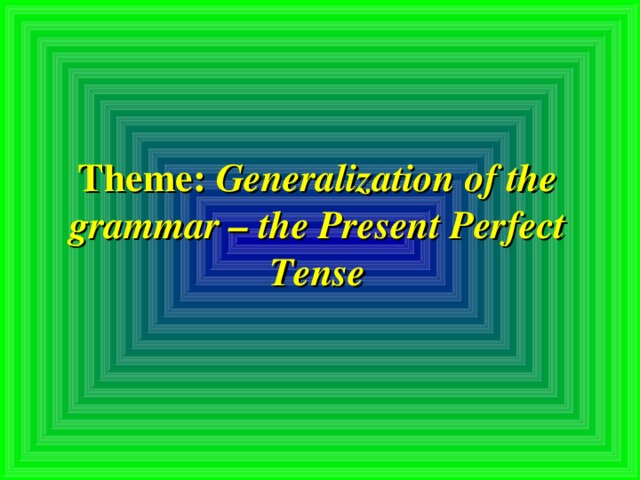
Theme: Generalization of the grammar – the Present Perfect Tense
![Phonetic drill. a) The sound [ æ] : map cap land cat rat has sat flag had map hat have b) A black cat sat on a mat and ate a fat rat. Words: to eat (ate, eaten) –кушать, есть to sit (sat, sat) – сидеть fat – жирный, толстый mat – коврик, половик](https://fsd.kopilkaurokov.ru/uploads/user_file_53e9f409b8c3b/img_user_file_53e9f409b8c3b_1_1.jpg)
Phonetic drill.
a) The sound [ æ] :
- sat
- flag
- had
- map
- hat
- have
b) A black cat sat on a mat and ate a fat rat.
Words: to eat (ate, eaten) –кушать, есть
to sit (sat, sat) – сидеть
fat – жирный, толстый
mat – коврик, половик
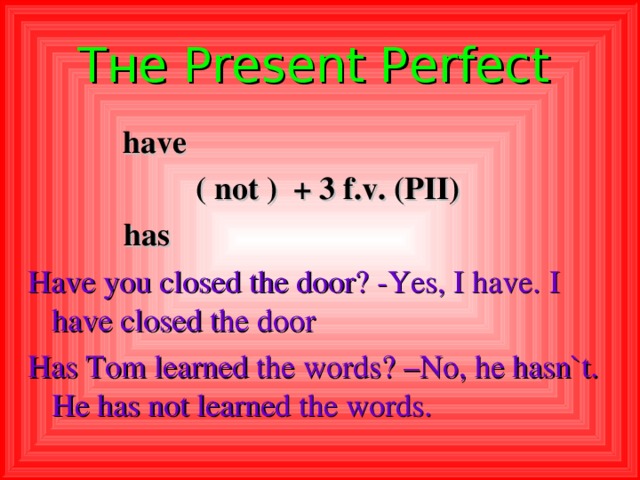
Тне Present Perfect
have
( not ) + 3 f.v. (PII)
has
Have you closed the door? -Yes, I have. I have closed the door
Has Tom learned the words? –No, he hasn`t. He has not learned the words.
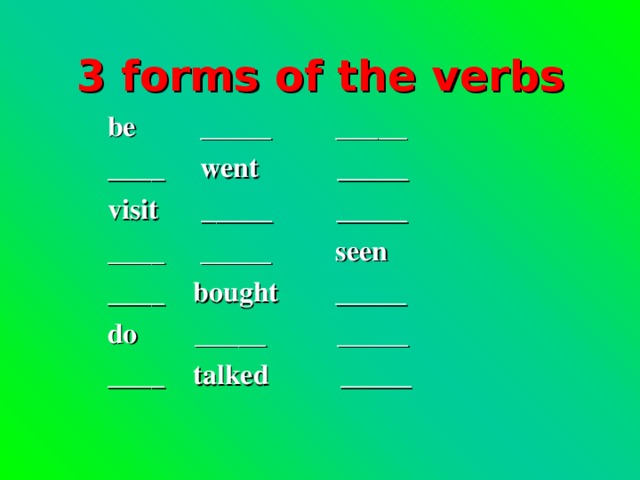
3 forms of the verbs
be _____ _____
____ went _____
visit _____ _____
____ _____ seen
____ bought _____
do _____ _____
____ talked _____
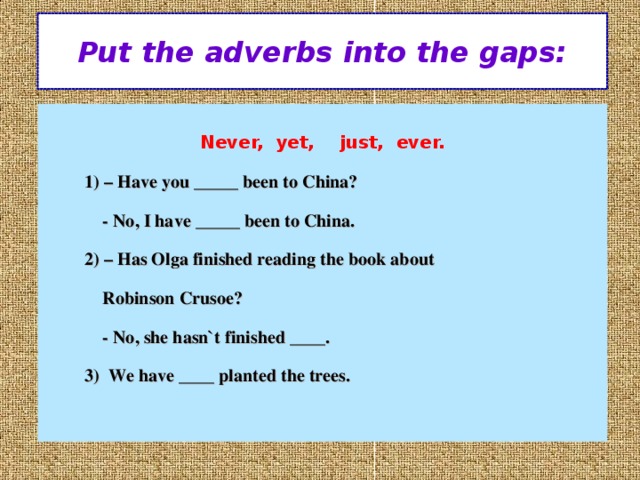
Put the adverbs into the gaps:
Never, yet, just, ever.
1) – Have you _____ been to China?
- No, I have _____ been to China.
2) – Has Olga finished reading the book about
Robinson Crusoe?
- No, she hasn`t finished ____.
3) We have ____ planted the trees.
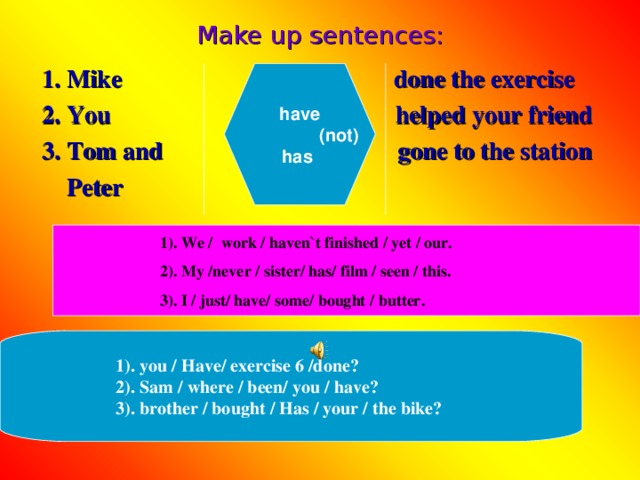
Make up sentences:
1. Mike done the exercise
2. You helped your friend
3. Tom and gone to the station
Peter
have
(not)
has
- . We / work / haven`t finished / yet / our.
- . My /never / sister/ has/ film / seen / this.
- . I / just/ have/ some/ bought / butter.
1). you / Have/ exercise 6 /done?
2). Sam / where / been/ you / have?
3). brother / bought / Has / your / the bike?

Disneylands around the world
- Disneyland in California is the home of Disneyland. It is on Anaheim , state California. It was opened in July 17 , 1955. About 15 -16 mln. people visit Disneyland every year.



Disneyland in Tokyo, Japan was opened on April 15, 1983. It has 7 different towns inside of it, such as Fantasyland, Adventureland, Tomorrowland and others.

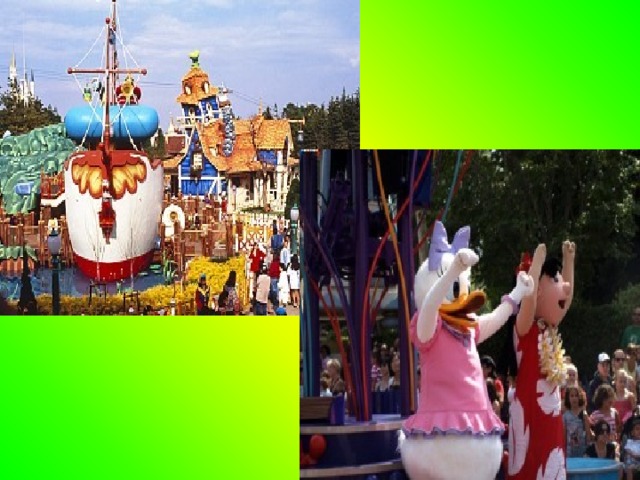

Disneyland in Paris, France started its work on April 12, 1992. It has more than 50 attractions. About 17 mln. people visit it every year.


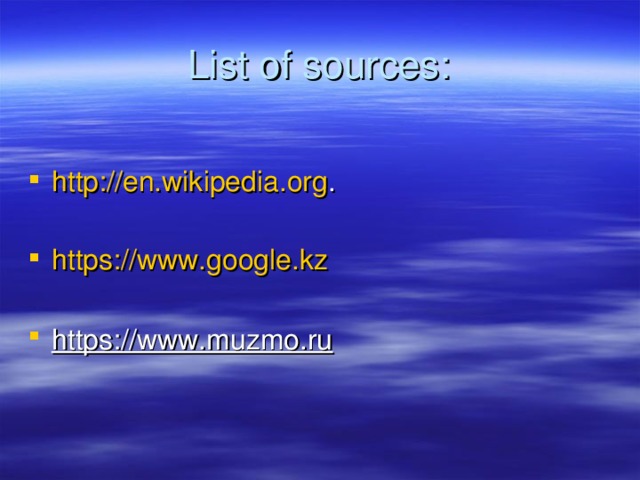
List of sources:
- http://en.wikipedia.org .
- https://www.google.kz
- https://www.muzmo.ru


![Phonetic drill. a) The sound [ æ] : map cap land cat rat has sat flag had map hat have b) A black cat sat on a mat and ate a fat rat. Words: to eat (ate, eaten) –кушать, есть to sit (sat, sat) – сидеть fat – жирный, толстый mat – коврик, половик](https://fsd.kopilkaurokov.ru/uploads/user_file_53e9f409b8c3b/img_user_file_53e9f409b8c3b_1_1.jpg)






























